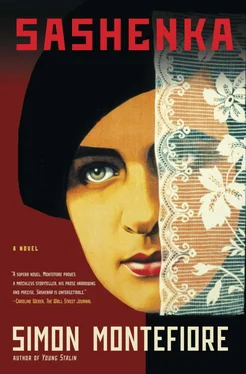“Marshal Satinov is most keen for me to glance at those sections…so I can appreciate your editorial work. Before he became too ill in the last day or so, he told Mariko to give you this present as another mark of his gratitude.” Katinka took the package in her hands. “Do you have the manuscript?”
“I really must ring the marshal’s house or speak to the Archive Director about this…”
“If you wish,” said Katinka, “but then I would have to give the gift to someone else.”
That decided the matter. Agrippina fell to her swollen, dimpled knees on the carpet and, bending over the heaps of paper, so that Katinka could again see the scaffolding of her garter belt, she began talking to herself softly, naming each manuscript. Finally, in triumph, she held up Satinov’s memoir. Breathing heavily and pink in the face, she sat back on the chair and focused her eyes on the package.
Katinka waited, expecting Agrippina to hand over the document now resting so comfortably on her lap, but nothing happened. Agrippina looked at her, plucked red eyebrows raised, and Katinka looked back. The atmosphere in the room changed as the air changes when it is about to rain.
“Oh yes, Agrippina Constantinovna, I almost forgot,” said Katinka at last. “A gift from the Satinovs,” and she handed over the weighty package.
Agrippina, beaming, grabbed the bag and drew out an enormous three-hundred-dollar bottle of Chanel No. 5.
“My favorite!” exclaimed Agrippina, hugging the bottle. “How did the marshal remember?”
“May I look at the manuscript?” asked Katinka.
“Only in this room,” answered Agrippina. “There are a few fragments that weren’t published. No one has ever read them except me.”
Katinka felt a sense of foreboding as she took the wad of pages.
“Put your feet up on the divan,” said Agrippina. “Enjoy the cold air of the fans, and the music of Glinka. You may take notes.”
Katinka glanced through the pages quickly. Much of it was familiar from Satinov’s turgid book—“How we conquered the Virgin Lands,” “Building homes for Soviet workers,” “Creating the Motor Tractor Stations,” “An interesting conversation with Comrade Gagarin on our conquest of space” and so on…Another waste of time, thought Katinka, but then, as Agrippina anointed her wrists and neck and even behind her ears with Madame Chanel’s priceless nectar, she found something that made her heart pound.
A conversation with J.V. Stalin, January 1940
By Hercules Satinov
One night about 2:00 a.m., I was at my desk in Old Square when the phone rang.
“It’s Poskrebyshev. Comrade Stalin wants to see you at the dacha. There’s a car waiting for you downstairs.”
Stalin favored me. We had made an alliance with Nazi Germany but we knew the war would come soon. The Party had ordered me to supervise the creation of new tanks and artillery for the Red Army. I had been invited to the dacha twice already to discuss my work. So I wasn’t afraid, though when you went to see Stalin you never quite knew where it would end.
The car had chains on its wheels to avoid skidding on the ice—it was minus twenty degrees, a truly freezing winter. We sped up the Mozhaisk Highway and turned off into a drive through a forest of oaks, pines, firs, maples and birches. The occasional guard could be seen against the snows.
Two security gates let us through. Lastly a green steel gate opened and there was Stalin’s real home, the Kuntsevo dacha, a plain two-story house, recently painted khaki in case war came.
A guard in NKVD blue met us at the door and showed me inside. I left my coat on the coatrack. Stalin’s office was on the left, heaped with books and journals, but then out of the library on the right, which was filled with bookcases, came Stalin himself in a grey tunic and boots.
“Evening, bicho ,” he said quietly, grinning. He always called me bicho —it means “boy” in Georgian. “Come in and have a drink and some food. Have you eaten?”
Of course I had eaten already but in those days we all worked according to Stalin’s nocturnal habits.
“Comrade Beria’s here and the others are coming.” He led the way into a big room with a huge dining-room table, heavy chairs and divans, the ceiling and walls paneled in Karelian pine, with posters by Russian artists. At one end of the table there was a buffet, a Georgian feast, with plates for us to help ourselves.
Lavrenti Beria was already standing at the table, holding a glass of wine. He greeted me in Georgian. With Stalin, you see, we were three Georgians in icy Russia!
Stalin, pouring me some wine and taking some himself, sat down at the table. I sat between the two of them.
“So,” said Stalin, lighting up a Herzegovina Flor cigarette, “what happened with the Sashenka case?”
The mention of her name always had an emotional effect on me, which I hoped was invisible.
“She seemed such a decent Soviet woman,” said Stalin. “I remember seeing her in Lenin’s office in Petrograd…” He shook his head sadly. “In our world, people can wear masks for decades.”
I looked at Beria.
“She confessed everything,” said Beria.
“The trial went smoothly,” I added.
“You knew her well, didn’t you, boy?” said Stalin to me.
I nodded.
“Did they all disarm and show remorse?” asked Stalin, dropping his cigarette into the bowl of his pipe and making puffs of smoke. “At the end?”
“Vanya Palitsyn disarmed,” said Beria, laughing hoarsely. “He took it well, shouting out, ‘Long live Comrade Stalin!’ at the last moment.”
Stalin sucked on his pipe, golden eyes half closed.
“But Mendel, what an old fool!” Beria continued. “He refused to disarm.”
“He was always such a stickler for rules,” said Stalin rather fondly.
“I did as you asked with Mendel,” said Beria.
Stalin and Beria exchanged a quick conspiratorial smile—I knew they enjoyed their intrigues. I once heard Beria talking about arranging a fatal car crash for a comrade who was too well known to arrest and execute.
“Boy, are you interested in hearing about Mendel?” Stalin asked me.
“Yes,” I said, though in truth I dreaded it.
“Tell him, Lavrenti,” ordered Stalin.
“I told Mendel, ‘Confess your crimes and Comrade Stalin will guarantee your life,’” explained Beria, “and you know what Mendel did? He shouted, ‘Never! I’m innocent and will be an honest Bolshevik until I die!’ He spat at me and then in Kobylov’s face…”
“That was a mistake,” mused Stalin.
“Kobylov went crazy and gave him a real beating, and that was that.”
“What pride! What foolish pride!” Stalin looked at me. “But you curated the case, boy?”
“Yes, Comrade Stalin. I curated as you asked.” I could not help but give Beria a heavy look. Stalin was so sensitive, he divined it immediately.
“Well?” he asked.
“Nothing special,” said Beria, and he kicked my shin hard under the table. But however dangerous Beria may have been, it was never a good idea to hide anything from Stalin.
“There was an irregularity, Comrade Stalin, in one of the executions,” I said finally, feeling unwell.
“An irregularity?” repeated Stalin coldly.
Beria gave me another kick in the leg but it was too late.
“The NKVD has professional and devoted cadres but this was a rare example of philistine infantilism,” I said, starting to sweat.
“Did you know about this, Comrade Beria?”
“I heard about it, Comrade Stalin, and am investigating.”
“I thought you’d cleansed the Organs of this sort of shit? The guilty must be punished.” He turned to us both and scrutinized us carefully. “Right. Comrades Beria and Satinov, form a commission of Comrades Shkiryatov, Malenkov, Merkulov. I want a report fast.”
Читать дальше












